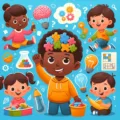Raising emotionally intelligent children is a key goal for many parents and educators. One effective way to teach children about social skills and emotions is through storytelling. Children’s books can be powerful tools in this regard, offering relatable scenarios and characters that help kids understand and express their feelings. In this article, we’ll explore 26 of the best children’s books that focus on social skills and emotions.
Why Books are Important for Emotional Development
Before we dive into the list, it’s essential to understand the impact of literature on a child’s emotional growth. Stories have a unique way of presenting complex ideas such as empathy, kindness, and resilience in a manner that children can grasp. They provide a safe space for children to explore emotions and the social dynamics of interacting with others.
Top Books for Young Children (Ages 3-5)
- The Feelings Book by Todd Parr
- My Many Colored Days by Dr. Seuss
- The Way I Feel by Janan Cain
Books for Early Elementary (Ages 6-8)
- Have You Filled a Bucket Today? by Carol McCloud
- The Invisible Boy by Trudy Ludwig
- Chrysanthemum by Kevin Henkes
Books for Older Elementary (Ages 9-12)
- Wonder by R.J. Palacio
- The Hundred Dresses by Eleanor Estes
- Because of Mr. Terupt by Rob Buyea
Inclusive Stories for All Ages
- It’s Okay to Be Different by Todd Parr
- Red: A Crayon’s Story by Michael Hall
- Julian Is a Mermaid by Jessica Love
FAQs About Children’s Books on Social Skills & Emotions
What makes a children’s book effective for teaching social skills?
An effective children’s book for teaching social skills should have relatable characters, understandable language, and situations that mirror real-life scenarios children might face. It should also encourage discussions about feelings and right behavior.
Can reading books really help children manage emotions better?
Yes, books can be a great resource for children to learn about emotions. They help children to name their feelings and understand that all emotions are natural and manageable through storytelling and character development.
How often should I read with my child to teach them these skills?
Regular reading sessions are beneficial. Aim for at least one story a day to build emotional and social learning into your child’s daily routine.
Are there books for children with special needs on this topic?
Absolutely, many books are designed to be inclusive and cater to children with special needs. Look for books with clear visuals and simple text that address a variety of emotional challenges and social situations.
How can I discuss the themes of the book after reading?
Ask open-ended questions about the characters and situations. Encourage your child to express what they might feel in a similar situation and discuss different outcomes based on various actions the characters could take.









